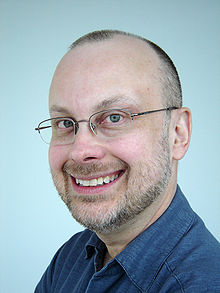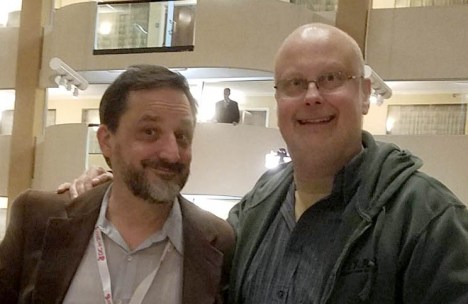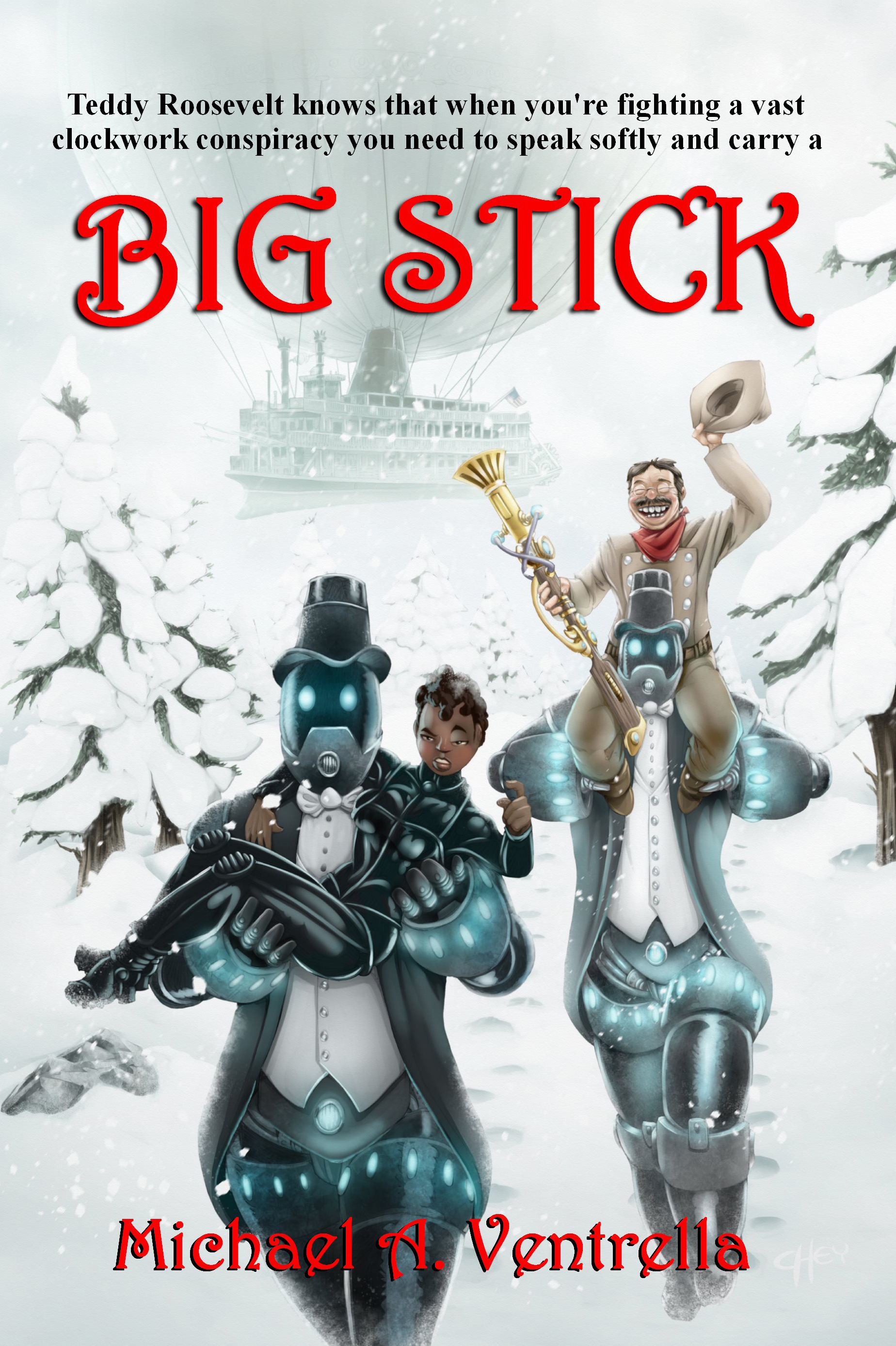MICHAEL A. VENTRELLA: I’m pleased to be interviewing one of my favorite writers, Robert J. Sawyer! Mr. Sawyer has won 51 awards for his fiction, including the Hugo and the Nebula, and the top science-fiction awards in Canada, China, France, Japan, and Spain, plus an Arthur Ellis Award from the Crime Writers of Canada.  The ABC TV series “Flashforward” was based on his novel of the same name. His physical home is in Toronto, and his online home is here!
The ABC TV series “Flashforward” was based on his novel of the same name. His physical home is in Toronto, and his online home is here!
The big news is that your 22nd novel RED PLANET BLUES has just been released. It’s a detective novel set on Mars done in the noir style, first person and everything. What made you want to write this?
ROBERT J. SAWYER: It’s become increasingly hard to tell traditional detective stories set in the present day. Everyone knows about CSI-style forensics: it’s almost impossible for a killer not to leave behind fingerprints or DNA. And our public and private spaces are increasingly covered by surveillance cameras; there’s almost no room left —- on Earth anyway —- for the traditional whodunit. But RED PLANET BLUES is set on a lawless frontier Mars -— where the security cameras have been smashed —- and it involves a technology that lets people transfer their consciousnesses into gorgeous android bodies, which don’t have fingerprints and don’t shed DNA. But who is actually inside any given body is anyone’s guess, letting me tell a good-old fashioned mystery … out on the final frontier.
VENTRELLA: From the opening chapters, it almost feels as a mixture of various pulp fiction styles. Was that the desire?
SAWYER: Absolutely. “Pulp” shouldn’t be thought of as a dirty word. Two of the most successful commercial fiction genres today are science fiction and mystery, and both have their roots in pulp magazines of the 1920s through 1950s. It seemed natural to bring those two genres together in that particular voice.
VENTRELLA: Was it difficult trying to capture that style of writing?
SAWYER: It was, but it was also very rewarding.  I immersed myself in noir mystery fiction to get the voice right, and Raymond Chandler, one of the fathers of that genre, wrote a very helpful essay entitled “The Simple Art of Murder” in 1950, which he gives lots of advice on how to write that form.
I immersed myself in noir mystery fiction to get the voice right, and Raymond Chandler, one of the fathers of that genre, wrote a very helpful essay entitled “The Simple Art of Murder” in 1950, which he gives lots of advice on how to write that form.
VENTRELLA: In some ways, a good science fiction novel is like a good mystery, although usually the “mystery” involves scientific discovery, doesn’t it?
SAWYER: Yes, indeed. I’ve always felt that science fiction has much more in common with mystery than with fantasy, anyway. Science fiction, after all, is about things that plausibly might happen; fantasy is about things that never could happen —- in that sense, they’re antithetical genres. But science fiction and mystery both prize rational thought, and both ask the reader to carefully pick up the clues the author has salted into the text —- in mystery, of course, to solve the crime, and in science fiction to puzzle out the unfamiliar backdrop against which the story is being told.
VENTRELLA: How did you approach writing a more traditional mystery? Did it require more outlining and preparation, for instance?
SAWYER: Absolutely. Mystery is a very complex narrative form – every piece has to fit together, and in the end it all has to go snick-snick-snick at it falls into place. That requires a lot of planning.
VENTRELLA: This seems like it was a fun novel to write. What novel gave you the most writing pleasure?
SAWYER: I think I enjoyed writing CALCULATING GOD the most; it was an absolute joy to write, in part because it was in a way an alternative version of my own life: I’d originally hoped to become a dinosaur specialist at Toronto’s Royal Ontario Museum, just like Tom Jericho, the main character in that novel.
VENTRELLA: Looking back, do you have a favorite novel (or series)?
SAWYER: My favorite series of mine is the WWW trilogy of WAKE, WATCH, and WONDER, about the World Wide Web gaining consciousness. I loved the range of characters I got to write: blind teenage math genius Caitlin Decter, her autistic father Malcolm Decter, the chimpanzee-bonobo hybrid Hobo, and Webmind itself, the vast world-spanning intelligence.
VENTRELLA: Which of your characters was the hardest for you to create?
SAWYER: Alex Lomax, the protagonist of RED PLANET BLUES because he’s so unlike me. He’s violent, coarse, hard-drinking, uneducated, and a loner; I’m a pacifist, I try to be kind, I don’t drink, I went to university, and I’m gregarious. But for RED PLANET BLUES to work as hardboiled detective fiction, Alex had to have the traits I gave him.
VENTRELLA: What book has surprised you the most upon completion?
SAWYER: TRIGGERS, which has just come out in paperback in North America after a successful run in hardcover. It was unlike any book I’d ever written before -– an out-and-out page-turner thriller. I found it very challenging, but ultimately very rewarding, to write.
VENTRELLA: A common theme in your books involves science versus religion. How do you try to approach that issue without possibly alienating certain readers (or does that come into play at all)?
SAWYER: As a writer, your job isn’t to be blandly acceptable to everyone; it’s to be the favorite author of a narrow segment of the reading public. If I wasn’t alienating some people, I wouldn’t be doing my job. My editor at Tor, David G. Hartwell, used to say to me sometimes, “You know you’re going to lose some readers if you keep that bit in,” and I’d say, “Yes, I understand that,” and we’d both nod and move on.  I’m interested in being provocative and in getting people to think about things they perhaps haven’t pondered for years.
I’m interested in being provocative and in getting people to think about things they perhaps haven’t pondered for years.
VENTRELLA: Here in the US, it seems that religion has trumped science much more than in Canada or Europe, especially in our political fights over creationism in the schools, abortion, and gay rights. Do you think we will ever evolve past religious belief, or will we still be believing a thousand years from now?
SAWYER: I think if we don’t evolve past fundamentalist religious belief, we won’t be here a thousand years from now; it’s fundamentalism that will lead to the wide-scale terrorism at home and abroad. As technology advances, and more and more destructive power is in the hands of individuals, someone will destroy us all, unless we as a species grow up. I tried to portray what that grown-up society might be like in my Hugo Award-winning HOMINIDS and its sequels.
VENTRELLA: Memory – or maybe “consciousness” – seems to be another thread common in your books. Who we are and what we perceive. Do you find that subject comes up subconsciously in your work or do you generally plan stories around that particular theme?
SAWYER: I’ve said that science fiction is the genre of intriguing juxtapositions, and that being a science-fiction writer is the best job for a science generalists – someone who likes to be involved with multiple disciplines. Well, there’s no more multidisciplinary area than consciousness studies, in which neuroscientists, computer scientists, cognitive theorists, quantum physicists, and philosophers all come together and spark off each other. Inner space is far more interesting to me than outer space, and so that’s what I write about.
VENTRELLA: I just finished FLASH FORWARD and noted how it ended with an idea that you later used for ROLLBACK. Had you considered making ROLLBACK a sequel originally, or did you just want to write about immortality in a similar way? 
SAWYER: I don’t like sequels. FLASHFORWARD and ROLLBACK both involve radical life prolongation because those are inevitable technologies; it’s going to happen, and if you’re writing about the future you have to acknowledge that. But the two books are unrelated to each other.
VENTRELLA: You’ve written about immortality in various ways in more than one novel. Is this because you’d like to be immortal? Is there something special about the topic that interests you?
SAWYER: What interests me about it is not dying. Sure, I’d like to live a very long time – I’m 52, and haven’t read 1% of the books I’d like to, I haven’t seen even a quarter of this planet (and I travel a lot), there is, rounded to the nearest percent, 100% of the human race I haven’t yet met. More: we still are trying to work out fundamental problems in social interaction, social justice, and international relations -– we’ve been struggling with them for thousands of years. Maybe that’s because, in all those millennia, no problem has ever been worked on for more than a few decades by any one person. We need the time to dig in and solve the really big conundrums; nature’s natural lifespan doesn’t provide enough time -– but science will.
VENTRELLA: How much input did you have in the “Flash Forward” TV series?
SAWYER: Lots. I met with David Goyer and Brannon Braga before I did the deal to let them adapt my book, and we discussed every change they wanted to make. I was consultant on every episode, spent a lot of time on the set and in the writers’ room in Los Angeles, and wrote the 19th episode, “Course Correction.”
VENTRELLA: Do you feel that the action bits they added were necessary for a TV audience and an on-going series? Did they distract too much from the story?
SAWYER: Sure, they were necessary for the TV audience. That’s why we added them. A novel can be cerebral -– people talking about ideas, or thinking about them without doing or saying anything -– but TV is a visual medium: things have to be happening constantly on screen or viewers turn away. As for distraction from the story, not at all: we had more story beats, more continuing characters, and a more involved plot, than just about any other show on the air at that time.
VENTRELLA: You’ve certainly had other works optioned before. Is there anything in the pipeline we can look forward to?
SAWYER: It looks like the movie version of THE TERMINAL EXPERIMENT is finally going to happen, and I’ve just been commissioned to write a screenplay adaptation of TRIGGERS for a feature film, and I have high hopes of that being made, too.
VENTRELLA: What is it about science fiction that attracts you?
SAWYER: The variety: I can write hardboiled detective fiction (RED PLANET BLUES), courtroom drama (ILLEGAL ALIEN), romance (ROLLBACK), thriller (TRIGGERS), allegory (FAR-SEER), and more, all without leaving the genre. Science fiction is the least-restrictive genre to be working in.
VENTRELLA: Science fiction doesn’t seem to sell as much as before; do you think we’ve just become so used to our gadgets and modern technology that reading about spaceships doesn’t hold the wonder it did when we were kids? (I’m about your age, by the way…)
SAWYER: No, I think it’s something you alluded to earlier: if you don’t teach the core truths about science –- cosmology, evolutionary biology, and so forth -– people lose interest in what the Canadian poet Archibald Lampman called “the wide awe and wonder of the night.” Yes, there’s not much science fiction about spaceships, but that never was what science fiction was all about. But it is about science, and a culture that devalues or distrusts science isn’t one that’s going to embrace a literature that’s built on it.
VENTRELLA: Who do you like to read?
SAWYER: Most of my reading is nonfiction -– Robert Wright, Steven Pinker, Ray Kurzweil, and so on. But within the science-fiction genre, I love the works of Julie E. Czerneda, Jack McDevitt, and Robert Charles Wilson.

Filed under: writing | Tagged: character development, FlashForward, Red Planet Blues, Robert J. Sawyer, science fiction, Triggers |



Interesting. Just been reading some classic detective fiction (Hammett and Chandler) myself to improve my plot composing skills.
LikeLike